Invasive Species Management Efforts
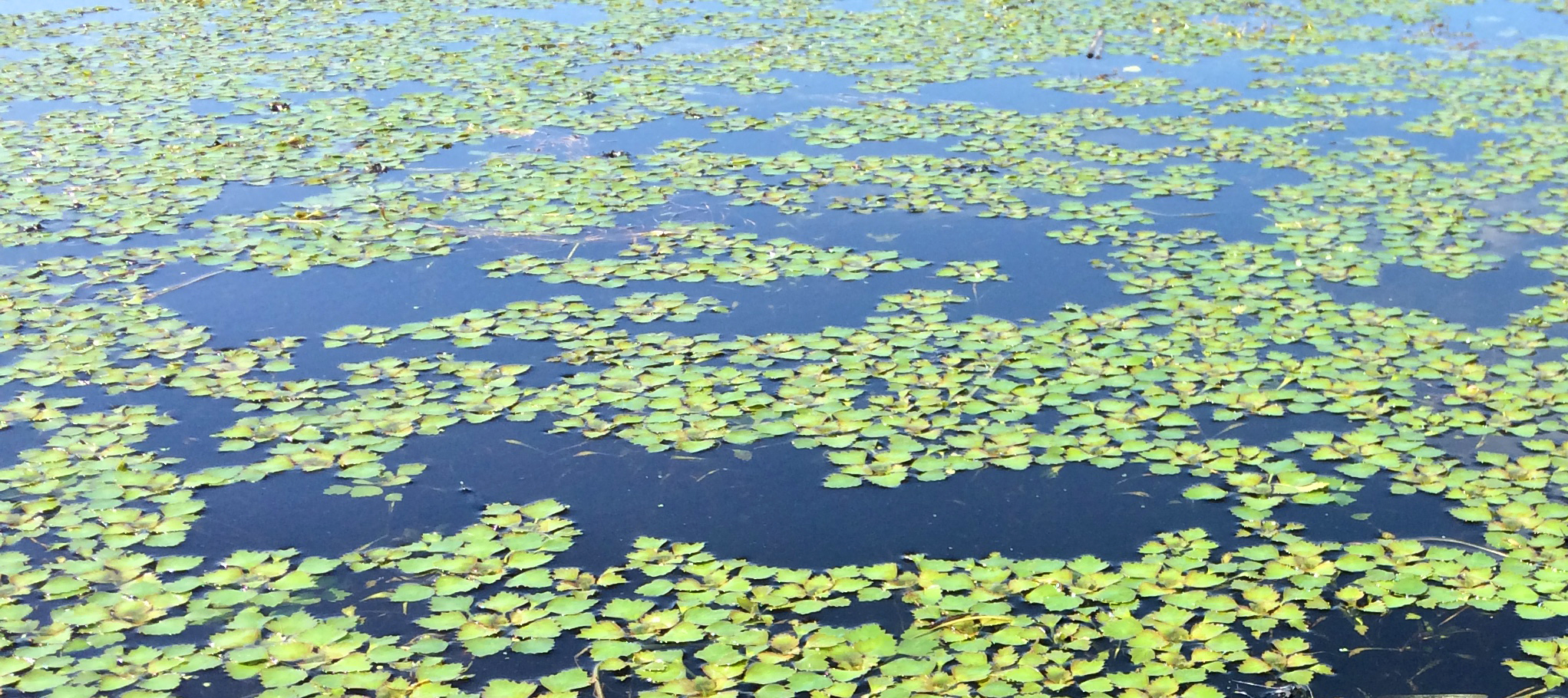
What is Water Chestnut and Why is it a Problem?
Water Chestnut (Trapa natans) is an invasive species that is native to Eurasia and Africa. It was introduced to the United States in the mid-1800’s, and since then has colonized areas of freshwater lakes, ponds, and slow moving streams and rivers. It spreads rapidly, and it has numerous negative impacts on aquatic ecosystems.
Water Chestnuts form dense mats of rooted vegetation that can be difficult to get through in a boat, kayak, canoe, or when swimming. The plants also choke out native vegetation, reducing its ability to survive which decreases local biodiversity. When it dies in the fall, it often consumes all of the oxygen in the water creating “dead-zones” within the water.
How to Identify Water Chestnut
Water Chestnut is a floating annual plant which has a submerged stem that is 12 to 15 feet long, with roots that anchor it into the soil beneath the water’s surface. The main plant floats on the water’s surface, and it has triangular leaves with saw-toothed edges. The leaves form a rosette around a central point, which includes four-petaled, white flowers which typically bloom in June. The fruits, also called “nutlets” are found at the base of the stem. They are blackish-brown hard nuts with barbed spines. Seeds within the nutlets remain viable for up to 12 years.
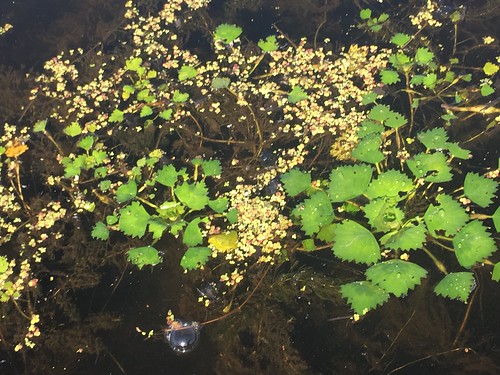
How it Spreads
The barbed nutlets detach from the plant’s stem and can be transported to other bodies of water by attaching themselves to waterfowl, or by floating downstream. They can also be transported from one body of water to another by clinging to recreational watercraft including (but not limited to) kayaks, boats, trailers, and fishing equipment.
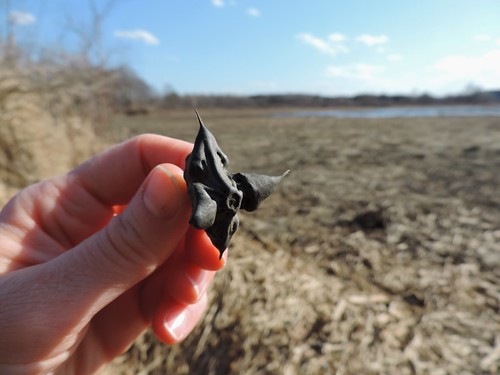
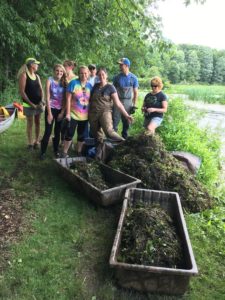 Methods of Control
Methods of Control
The most effective management tool to control Water Chestnut is hand-pulling. Early detection is key for containing and controlling the spread of all invasive species. Hand-pulling when the rosettes first appear (late May through early July for Western New York) is ideal.
The smaller the size of the infestation, the easier it is to eradicate. Because the Water Chestnut seeds remain viable for up to 12 years, annual monitoring and removal efforts are essential for long-term eradication.
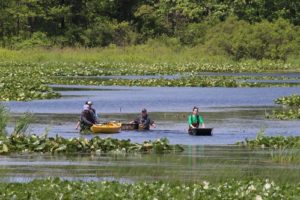 ACNC and Water Chestnut
ACNC and Water Chestnut
Water Chestnut was first discovered in Audubon Community Nature Center’s Big Pond in 2006. Since then, ACNC has worked to monitor and remove it from the ponds and waterways within the ACNC site.
Over the first two years, ACNC applied herbicides to the Water Chestnut plants to help reduce the infestation to a more manageable size. Since then, summer staff and volunteers have performed hand-pulling of the plants, which are placed into floating jet-sleds, measured, recorded, and then disposed of in an upland area that has been designated by the Department of Environmental Conservation.
ACNC partners with Western NY PRISM (Partnership for Regional Invasive Species Management) to ensure effective removal of the plants on the property.
More information about Water Chestnut
Report Water Chestnut
Get Involved with Aquatic Invasive Species Removal
Address
Audubon Community Nature Center
1600 Riverside Road
Jamestown, NY 14701
(716) 569-2345
info@auduboncnc.org
Hours and Admission
Nature Center Hours:
Monday - Saturday
10:00 a.m. - 4:30 p.m.
Sunday
1:00 - 4:30 p.m.
Building Admission:
Members - Free
Non-member Adult (ages 16+) - $6
Non-member Child (ages 3 - 15) - $2
Children ages 2 and under - Free
Maximum cost for a Family - $15
Free admission to the Nature Center for SNAP/EBT cardholders.
Free admission for all on Sundays
Grounds and Outdoor Exhibits:
Open daily, year round from dawn to dusk, free of charge
Thank you, Community Partners
Audubon Community Partners make a significant financial contribution each year because they believe that every child deserves the opportunity to have a real and healthy connection to nature.
Bruce and Juline Battler
Carnahan-Jackson Foundation
Chautauqua Region Community Foundation
Donna and Mark Hampton
Holmberg Foundation
Hultquist Foundation
Jessie Smith Darrah Fund
Kinetic Internet Service Provider
The Lenna Foundation
The Ralph C. Sheldon Foundation
David Campbell
Sue and Bill Chandler
Hal and Mary Conarro
Cummins Jamestown Engine Plant
Bob and Kathy Frucella
Kravitz Tree Service
Thomas Kuntz and Meredith Kuntz
Doug and Lamae McCullor
National Fuel Gas Company
Southern Chautauqua
Federal Credit Union
Weinberg Financial Group
Curt and Susie Westrom
Whirley-DrinkWorks!
Jeanne Wiebenga and Jane Stirniman

